Timor-Leste hosts the Asia-Pacific Solidarity Conference with Western Sahara and reiterates its unwavering support for the right to self-determination of the Sahrawi people
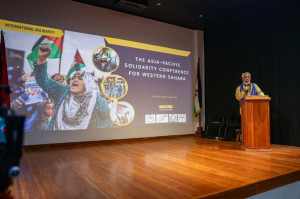
On May 19th, 2025, the city of Dili hosted the Asia-Pacific Solidarity Conference with Western Sahara, a joint initiative of the Forum of Non-Governmental Organisations of Timor-Leste (FONGTIL), the Timor-Leste Solidarity Movement with Western Sahara, the Japan Solidarity Group for Western Sahara, and the Embassy of the Sahrawi Arab Democratic Republic in Timor-Leste. The event brought together representatives from civil society, solidarity movements, and diplomatic delegations across the Asia-Pacific region, including participants from Japan and Australia, and was attended by Prime Minister Kay Rala Xanana Gusmão as the guest of honour. 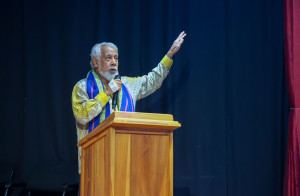
In his speech during the event at the Fundação Oriente, the Head of Government welcomed the participants, placing special emphasis on the delegation from the “distant but close to our hearts” land of Western Sahara, reaffirming “the commitment [of Timor-Leste] to the right of peoples to self-determination, by peaceful means and based on international law”.
“This conference is a historic moment. Gathering here in Southeast Asia to support the cause of the Sahrawi people is essential to raise awareness of an issue that, unfortunately, has had little voice on the international stage”, said the Prime Minister, welcoming the active role of civil society organisations in organising the initiative. 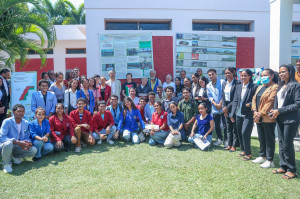
The Prime Minister recalled that, on the day following this conference, Timor-Leste celebrates the 23rd anniversary of the Restoration of Independence and highlighted the parallels with the struggle of the Sahrawi people. “Timor-Leste stands alongside Western Sahara in its unwavering determination to achieve self-determination and international recognition, because few countries understand better than we do what it means to be ignored by an international order that devalues the weakest and most vulnerable”, he said.
Alerting to the prolonged suffering of the Sahrawi people, the Head of Government stated that, “Western Sahara has been occupied for five decades. Half a century of violence and repression. Half a century of disappointment with the international system. Half a century of colonialism and commercial interests denying the Sahrawi people their right to self-determination”.
He appealed to António Guterres, the Secretary-General of the United Nations, to “fully embrace the just cause of the Sahrawi people, as Kofi Annan once embraced the cause of the Timorese people”. 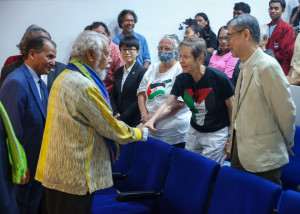
The Prime Minister also emphasised that “our goal is to achieve, through mutual understanding and dialogue between the Polisario Front and Morocco, a peaceful and negotiated solution that is acceptable to both parties but respects the will of the Sahrawi people”. 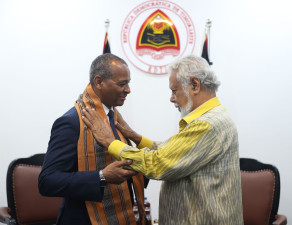
The conference also offered an opportunity for a meeting at the Government Palace between the Prime Minister and Sidi Mohamed Omar, the POLISARIO Front's representative to the United Nations, during which he conveyed greetings from the President of the Sahrawi Arab Democratic Republic, Brahim Ghali.
The meeting focused on human rights violations in the occupied territories and the necessity to reactivate the referendum process promised by the UN. Both sides reaffirmed the historical and emotional bonds that unite the Timorese and Sahrawi peoples, forged through shared experiences of resistance to colonialism. 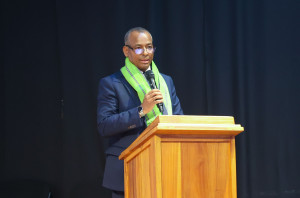
During the conference sessions, several representatives of solidarity movements condemned Morocco's occupation of Western Sahara, called for the extension of the mandate of the United Nations Mission for the Referendum in Western Sahara (MINURSO) to encompass human rights monitoring, and urged the international community to cease the exploitation of Sahrawi natural resources and demand the release of political prisoners. In a joint appeal, Timorese civil society organisations and movements from the Asia-Pacific region urged the United Nations Special Committee on Decolonisation (C-24) to expedite the decolonisation process of Western Sahara, the last colony on the African continent. 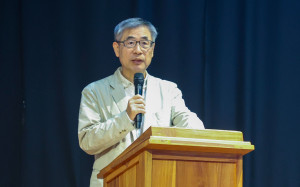
In concluding the conference, Sidi Mohamed Omar expressed gratitude to the people and Government of Timor-Leste for their solidarity, emphasising that “occupation does not confer legitimacy” and that “international law remains the only legitimate path to self-determination”.
Akihisa Matsuno, from the Japan Solidarity Group, also recounted his experience during the referendum in Timor-Leste in 1999 to emphasise the importance of political will and international mobilisation in self-determination processes.










































